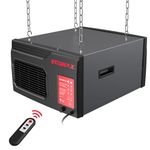6 bestAir Filtration For Woodshopof February 2026
112M consumers helped this year.
1
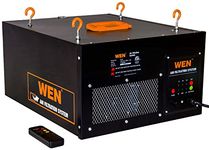
WEN 3410 3-Speed Remote-Controlled Air Filtration System (300/350/400 CFM), Basic w/ RF Remote (400 CFM)
WEN

10.0
2
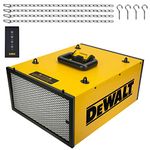
DeWALT Air Filtration System Air Cleaner H13 Ceiling Air Cleaner for Workshop DWXAF101
DEWALT

10.0
3
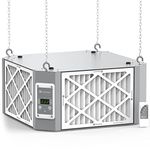
Denwenny 360 Degree Intake System Woodworking Shop - (1350CFM) with Strong Vortex Fan, Built-in Ionizer, Garage Works Shop, Shop Dust Collectors, KingMaster F12D Gray (2023 Updated)
Denwenny

9.9
4
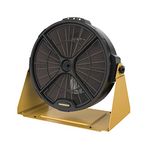
Powermatic PM1250 Electrostatic Air Filtration System, 0.1 Micron Filter, 754 CFM, 1Ph 120V (1791331)
Powermatic

9.6
5

Shop Fox W1830 1/8 HP Single Phase 3-Speed 260/362/409 Cfm Hanging Air Filter with Remote Control and Timer
Shop Fox

9.3
A Guide to Selecting the Best Air Filtration For Woodshop
Choosing the right air filtration system for your woodshop is essential for maintaining a clean, safe, and healthy workspace. Woodworking creates a lot of fine dust and particles that can be harmful if inhaled and can also settle on your tools and projects, affecting their quality. When selecting an air filtration unit, it's important to understand the key features that impact its performance and suitability for your specific shop size and usage. By focusing on the main specifications, you can ensure you pick a system that effectively manages dust and keeps your air clean.
Airflow Capacity (CFM)
Airflow capacity, measured in cubic feet per minute (CFM), tells you how much air the filtration system can move in a minute. This is important because it determines how quickly and effectively the unit can clean the air in your shop. Lower CFM units (around 300-500 CFM) are suitable for small, single-person workshops, while medium CFM units (500-1000 CFM) work well for average-sized shops. Large shops or those with multiple machines running at once may need units with over 1000 CFM. To pick the right CFM, consider the size of your shop and how much dust you generate; a higher CFM is better for larger spaces or heavy use.
Filtration Stages and Filter Type
Air filtration systems often use multiple stages of filters, such as pre-filters for larger particles and finer filters (like HEPA or MERV-rated filters) for tiny dust. The type and number of filters affect how well the system captures different sizes of dust. Basic systems may only have a single filter, which is fine for coarse dust, while more advanced systems use two or three stages to trap both large and microscopic particles. If you do a lot of sanding or work with fine woods, look for systems with HEPA or high MERV filters for better protection. Choose based on the type of dust you create and your sensitivity to air quality.
Noise Level
Noise level, usually measured in decibels (dB), indicates how loud the air filtration system will be when running. This matters because a noisy unit can be distracting or uncomfortable during long work sessions. Quiet units (below 60 dB) are ideal for small shops or if you value a peaceful environment, while louder units (above 70 dB) may be acceptable in larger, industrial settings. Think about your tolerance for noise and how close the unit will be to your work area when making your choice.
Mounting Options
Air filtration units can be mounted in different ways: ceiling-mounted, wall-mounted, or portable (floor-standing). Ceiling or wall-mounted units save floor space and are good for small or crowded shops, while portable units can be moved around as needed. The right choice depends on your shop layout and whether you need flexibility or want to keep the unit out of the way.
Filter Maintenance and Replacement
Filters need to be cleaned or replaced regularly to keep the system working well. Some units have easy-access filters or indicator lights to remind you when it's time for maintenance. If you want less hassle, look for systems with washable or long-lasting filters. Consider how often you use your shop and how much dust you create to decide how important easy maintenance is for you.
Coverage Area
Coverage area tells you the maximum size of the room the unit can effectively clean, usually given in square feet. This is important to ensure the system can handle your entire shop. Small units may cover up to 300 square feet, while larger ones can handle 1000 square feet or more. Measure your shop and choose a unit that matches or exceeds your space for the best results.
Best Reviews Guide Newsletter
Get exclusive articles, recommendations, shopping tips, and sales alerts
Sign up for our newsletter to receive weekly recommendations about seasonal and trendy products
Thank you for subscribing!
By submitting your email address you agree to our Terms and Conditions and Privacy Policy
